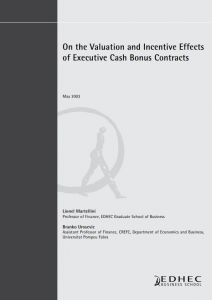

On the Valuation and Incentive Effects of Executive Cash Bonus Contracts
Executive compensation packages are often valued in an inconsistent manner: while employee stock options (ESOs) are typically valued ex-ante, i.e., before uncertainties are resolved, cash bonuses are valued ex-post, i.e., by discounting the realized cash grants. Such a lack of consistency can, potentially, distort empirical results. A related, yet mostly overlooked, problem is that when ex-post valuation is used pay-performance measures can not be well defined. Consistent use of ex-ante valuation for all components of a compensation package would simultaneously resolve both of these problems and provide a natural framework for the analysis of agency problems.
Author(s):
Summary:
Executive compensation packages are often valued in an inconsistent manner: while employee stock options (ESOs) are typically valued ex-ante, i.e., before uncertainties are resolved, cash bonuses are valued ex-post, i.e., by discounting the realized cash grants. Such a lack of consistency can, potentially, distort empirical results. A related, yet mostly overlooked, problem is that when ex-post valuation is used pay-performance measures can not be well defined. Consistent use of ex-ante valuation for all components of a compensation package would simultaneously resolve both of these problems and provide a natural framework for the analysis of agency problems.
Register to download PDF
Register/Log in| Type : | Working paper |
|---|---|
| Date : | 05/01/2003 |
| Keywords : |
Performance |

